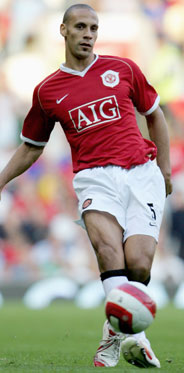|
RIO FERDINAND
05. RIO FERDINAND Rio Ferdinand was born on 8th November 1978 when he was born as the first child of parents Julian and Janice in Peckham, South East London. As a youngster, Rio first seemed destined for great things when he played as a centre-forward for his local junior team Bloomfields. According to his personal website, Rio regularly scored 30 goals per season! He then switched to another junior team, Eltham Town, at Under-13 and Under-14 levels. He also played in central midfield at Eltham, where he caught the eye of the West Ham scouts. Rio first signed for West Ham as a schoolboy, aged fourteen. Upon leaving school at sixteen, he ignored the overtures from Middlesbrough, Norwich City, Millwall, Charlton and Chelsea and decided to stay with the Hammers, this time on a two-year YTS contract. He was paid the going rate for an apprentice footballer, £30 per week, and his duties included cleaning the boots of Upton Park legend Tony Cottee and the manager himself, Harry Redknapp. On the field, he helped West Ham's youth team to win the South East Counties League in 1995/96 with a record number of points. Rio's attitude and ability clearly impressed Redknapp, who signed him on his first professional contract at the age of 17. Harry then handed Ferdinand his first taste of senior football on 5 May 1996, sending him on as a substitute against Sheffield Wednesday at Upton Park. The following season saw Redknapp make good use of the loan system to send Rio to Bournemouth for two character-building months in the Football League. The defender made ten appearances in Division Two for the Cherries between 9 November 1996 and 11 January 1997, and returned to West Ham ready for another stint in the senior team. Rio started a senior West Ham match for the first time on 25 January 1997, only to find himself on the receiving end of a shock result - Wrexham knocked the Hammers out of the FA Cup, 0-1, at Upton Park. Rio's first Premiership start also resulted in defeat, 1-2 against Blackburn at Ewood Park. The date, 1 February 1997, was still memorable though for the occasion of Rio's first senior goal. Rio made 152 (6) appearances for West Ham, scoring two goals, before he was snapped up by Leeds United for £18million on 26 November 2000. Ironically his last game for West Ham was against Leeds on 18 November 2000 - the Hammers winning 1-0 at Elland Road. The £18m transfer fee was then a British record for any player and a world record fee for a defender but again Rio did not make the best of starts, losing 1-3 at Leicester City on his Leeds debut and then 0-1 at Southampton in the second game. Life at Leeds soon improved, however, as Rio helped David O'Leary's side to reach the semi-finals of the UEFA Champions League just five months later. He also scored three goals in this first season for Leeds - against Liverpool, Deportivo La Coruna and, ironically, West Ham. Rio's second season at Leeds, 2001/02, was less successful for the team but it saw him develop into an even more accomplished defender - and consequently a much sought-after asset. A transfer to Manchester United was mooted even before the World Cup Finals, in which Rio was one of England's outstanding performers. Rio's transfer value sky-rocketed during the 2002 World Cup but the Reds maintained their interest and after weeks of speculation, followed by days of negotiation, they signed Rio Ferdinand for a new British record fee of £30million. The sum also restored Rio to the position of the world's most expensive defender, topping the £22m that Juventus paid Parma for Lilian Thuram in 2001. The Duran Duran song "Rio" has been used in football chants both for and against Ferdinand; in fact in 2002, fan Simon Le Bon (Duran Duran's lead singer) promised to re-record one of the football chants if the team won. (They didn't.) In 2003 he failed to attend a drugs test, claiming he had forgotten because he was preoccupied with moving house. The FA imposed an eight month ban from January 2004 at club and international level, meaning he would miss the rest of the league season and some of the next along with all of Euro 2004. Manchester United's appeals to have the ban reduced were turned down. John Terry replaced him in the England side until his return on 9 October 2004 in their World Cup qualifier against Wales. The Rio Ferdinand drugs test saga has caused a huge debate over how footballers found guilty of drug offences (failing or missing tests) should be treated. One of Manchester United's reasons for appealing against the ban was that a Manchester City player had also missed a drugs test but escaped with just a £2,000 fine. Several seasons earlier, Ipswich midfielder Adam Tanner had been banned for just three months after failing a drugs test. In March 1995, Chris Armstrong had become the first Premiership footballer to fail a drugs test yet had returned to the game within a month after attending a brief rehab programme. |
||||
This website is in no way authorised by Manchester United PLC. © Copyright by mmaster 2005. All Rights Reserved. |
|||||
